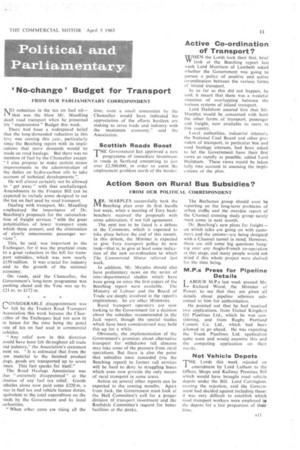' No-change ' Budget for Transport
Page 13

If you've noticed an error in this article please click here to report it so we can fix it.
FROM OUR PARLIAMENTARY CORRESPONDENT
MO reduction in the tax on fuel oil—
that. was the blow Mr. Maudling dealt road transport when he presented his " expansionist " Budget this week.
There had been a widespread belief that the long-demanded reduction in this levy was corning this year, particularly since the Beeching report with its implications that more demands would be Made on road haulage. But there was no mention of fuel by the Chancellor except: "1 also propose to make certain minor improvements in the administration of the duties on hydro-carbon oils to take account of technical developments ".
He will almost certainly not be allowed to "get away" with that unchallenged. Amendments to the Finance Bill can be expected to include some designed to cut the tax on fuel used by road transport.
Dealing with transport, Mr. Mourning emphasized the importance of Dr. Beeching's proposals for the rationalization of freight services with the great potentialities of lower transport costs which these present, and the elimination of clearly uneconomic passenger services ".
This, he said, was important to the Exchequer, for it was the practical route to a great reduction in the bill for transport subsidies, which was now nearly £150 million. It was crucial for industry and to the growth of the national economy.
On roads, said the Chancellor, the Government's long-term programme was pushing ahead and the Vote was up by £21 in. to f.172 m.
rONSIDERABLE disappointment was 1/4-, felt by the Traders Road Transport Association this week because the Chanzellor of the Exchequer had not seen fit o lessen for the time being the penal rate of tax on fuel used in commercial vehicles.
"Any relief now in this direction would have been felt throughout all trade ind industry," the Association's statement went on. "it is estimated that from the -aw material to the finished product ;tage, goods are transported up to seven :imes. This fact speaks for itself."
The Road Haulage Association was dso "extremely disappointed" at the tbsence of any fuel tax relief. Goods rehioles alone now paid some £220 m. a tear in fuel tax and vehicle licence duties, iquivalent to the total expenditure on the .oads by the Government and by local iulhorities.
"When other costs are rising all the time, even a small concession by the Chancellor would have indicated his appreciation of the efforts hauliers are making to serve trade and industry with the maximum economy," said the Association.








































































































































